When it comes to city passes and travel cards, it’s usually fairly easy to figure out whether they would be worth it for you or not. For things like the Paris Pass or London Pass, they have a list of the most popular attractions and how much they cost, right there for you to see. The Swiss Travel Pass, however, is shrouded in mystery, or at least it was until I spent several days tracking down all of the prices and benefits.
A great many of the visitors and commenters on my popular page about where to go in Switzerland on a short visit are wondering whether the Swiss Travel Pass is a good deal. Embarrassingly, I’ve always had to answer that I found the pass too confusing to confidently advise people on. Now that has all changed, after literally days of research.
Note: This article was last updated in February, 2024.
Disclosure: This is a reader-supported website and some of the links are affiliate links where a small commission is paid to help keep this site going, but the cost to visitors is the same. The Swiss Travel Pass seems quite expensive at first, so it felt like it might be hard to get your money’s worth out of it. As it turns out, it’s pretty easy to get good value, and it’ll be a good deal for many visitors.
New in 2024
Prices increased an average of 5.9% from 2023 on the Swiss Travel Passes, but the Half Fare Card remains at CHF120, which is where it’s been for many years. Train fares in the country increased by similar percentages so the value is basically unchanged. There were no other notable changes to service or the included attractions and train routes.
>>>Buy the Swiss Travel Pass online
Where to stay in Interlaken and the Lauterbrunnen Valley
Since most people reading this will be visiting the Interlaken area and I get so many questions about it, I decided to write a detailed guide on which area to stay in while visiting this area.
>>>Where to stay in Interlaken or the Lauterbrunnen Valley in Switzerland
I included many huge photos in that post so readers will be able to get a better idea of what each place looks like and they are worth a look by itself.
>>>Lucerne or Interlaken: Which to visit and how long to stay?
The article just above will help you decide on how long to spend in each of Switzerland’s two best tourist areas.
Are you 100% sure where you want to go in Switzerland? This should help
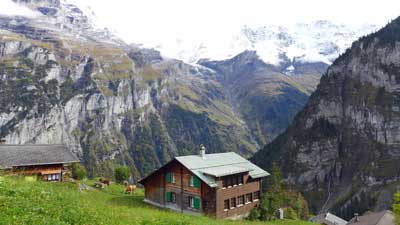
Zurich and Geneva are pleasant but dull. The good news is that Switzerland is packed with amazing sights and none of them are the big cities. If you aren’t 100% locked in yet, please read the article below and I think you’ll enjoy it.
Is the Swiss Travel Pass a good deal? Here's the short version

The bottom line is that the scenery, train journeys, and cable car rides in Switzerland are stunning and not found anywhere else in the world. They are also quite expensive if you pay for them one at a time. So no matter how you visit Switzerland, you are going to be paying quite a bit, or skipping the absolute best things that you’ve come there to see.
With good planning it’s quite easy to get great value out of a Swiss Travel Pass, but it might be a poor choice for those who don’t like to plan ahead. You can easily do a scenic train ride and a cable car in the same day, and still have time to do a scenic hike in the process.
First class or second class? Good news for most people
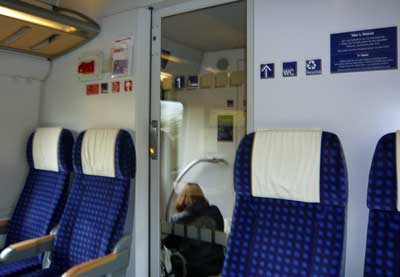
That said, Swiss Trains are literally the nicest in Europe and even the Second Class seats and carriages are nicer and roomier than trains in neighboring countries. The First Class seats are larger and nicer with only 3 across the cabin instead of 4, but honestly Second Class is perfectly comfortable for almost everyone.
Again, First Class on European trains like this is generally popular with business travelers where the company is paying and they need to get work done during the ride, and also senior citizens who don’t want to worry about a carriage full of backpackers. For most of the rest of us, Second Class is more than comfortable enough and the seat width and legroom compare to business-class airline seats. I’m a big and tall guy and I almost always travel in Second because it’s plenty comfortable enough and all the seats arrive at the same time anyway.
The longer you'll be in Switzerland, the better deal a Swiss Travel Pass will be
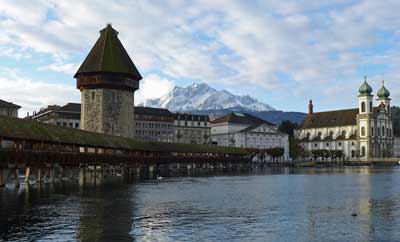
In other words, if you are staying 5 days or fewer, you have to do the math to determine your best option. But if you are spending even 6 or 7 days in Switzerland then the 6-day or 8-day Pass is almost guaranteed to be a great deal and your best choice. Once you have a Swiss Travel Pass you’ll absolutely love the ability to just hop on any train (excellent trains, always on time) and most boats and cable cars without having to worry about the cost. The per-day cost of an 8-day Pass even if you only use 6 of those days is about CHF65, and Switzerland is filled with amazing train rides and boats and cable cars that can get you that much value before noon each day.
Schilthorn (50% discount) and Jungfraujoch (25% discount) are cheaper with a Swiss Travel Pass
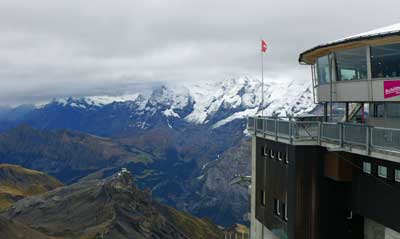
Both of those peak experiences are extraordinary and different from each other. Even so, compared to Jungfraujoch, Schilthorn is also faster and more comfortable on the way up and down. You can enjoy an excellent visit to Schilthorn in 4 hours or so (or a bit longer if you eat at the spinning Piz Gloria restaurant at the top), while a visit to Jungfraujoch requires closer to 6 hours.
NOTE: Schilthorn closes for maintenance for a week or two in late November most years.
Consider the Swiss Half-Fare Card instead
If you AREN’T going to be doing two or more of the long (and expensive) scenic train trips, you will get much better value out of the Swiss Half-Fare Card, which is explained a bit below.
Mt Rigi, near Lucerne, is 100% covered by the Swiss Travel Pass
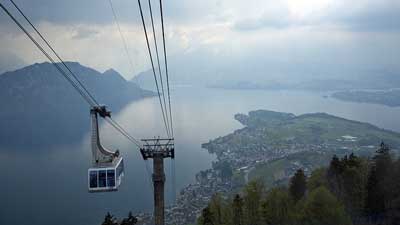
Is a Swiss Travel Pass right for you?
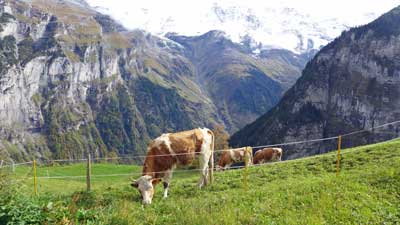
Most people only visit Switzerland for 5 or 6 days at most, so the 3-day and 4-day passes are the ones to focus on. But if you are staying for 8 days or more, those longer passes are almost certainly a great deal for you.
Long story short, if you plan on doing 2 of the more expensive scenic trains and the Jungfraujoch railway or the Schilthorn cable car, then the pass will save you money. Switzerland is expensive, but it’s worth it, and the travel pass can help make it a bit more affordable.
What the Swiss Travel Pass includes
- Free rail travel on normal trains and most scenic trains
- Discounted travel (about 50%) on popular tourist mountain trains
- Discounted travel (about 50%) on popular tourist cable cars
- Free travel on public transport in 75 towns and cities
- Free entry to around 500 museums in Switzerland
The Swiss Travel Pass covers the fare on the most popular scenic and panoramic trains. You can choose a normal seat in a regular carriage for no additional cost, but there is a supplement of CHF8 to CHF49 for a reserved seat in one of the special panorama carriages on these routes.
Prices of the 2024 Swiss Travel Pass
1st Class
- Adult 3-day Pass: CHF389
- Youth (4 to 25) 3-day Pass: 274
- Adult 4-day Pass: 469
- Youth (4 to 25) 4-day Pass: 330
- Adult 6-day Pass: 602
- Youth (4 to 25) 6-day Pass: 424
- Adult 8-day Pass: 655
- Youth (4 to 25) 8-day Pass: 469
- Adult 15-day Pass: 723
- Youth (4 to 25) 15-day Pass: 512
2nd Class
- Adult 3-day Pass: CHF244
- Youth (4 to 25) 3-day Pass: 172
- Adult 4-day Pass: 295
- Youth (16 to 25) 4-day Pass: 209
- Adult 6-day Pass: 379
- Youth (16 to 25) 6-day Pass: 268
- Adult 8-day Pass: 419
- Youth (16 to 25) 8-day Pass: 297
- Adult 15-day Pass: 459
- Youth (16 to 25) 15-day Pass: 328
Swiss Travel Pass Flex
This version costs a bit more, but you don’t have to use the travel days consecutively. It’s a great option for anyone who won’t be taking longer train rides each day.
- Adult 3 Flex days in 1 month (1st Class): CHF445
- Adult 3 Flex days in 1 month (2nd Class): 279
- Adult 4 Flex days in 1 month (1st Class): 539
- Adult 4 Flex days in 1 month (2nd Class): 339
- Adult 6 Flex days in 1 month (1st Class): 644
- Adult 6 Flex days in 1 month (2nd Class): 405
- Adult 8 Flex days in 1 month (1st Class): 697
- Adult 8 Flex days in 1 month (2nd Class): 439
- Adult 15 Flex days in 1 month (1st Class): 755
- Adult 15 Flex days in 1 month (2nd Class): 472
Where to buy the Swiss Travel Pass
The Swiss Half-Fare Card – A better option for many visitors
Far less confusing than the Swiss Travel Pass, you can instead get a Swiss Half-Fare Card, and it will be a better deal for many travelers. The price is lower and it’s much easier to do the math, and the discounts are greater on some things as well.
- Swiss Half-Fare Card for 30 days: Adults – CHF120 or US$129
What you get:
Those who buy the Swiss Half-Fare Card will get 50% discount on all trains, buses, and boats in Switzerland for up to 30 days, as well as 50% off all public transportation in 75 cities and towns.
>>>Buy the Swiss Half-Fare Card
Why the Half-Fare Card is a better deal for many
While the Swiss Travel Pass is a great deal for those doing many of the expensive scenic journeys and mountain sights within a few days, it’s not good value for those who are doing fewer of the expensive trips and/or those who are staying longer. Also, the Swiss Travel Pass only provides a 25% discount on the amazing Jungfraujoch Railway, which costs between CHF120 and CHF224 return depending on your starting point, while the Half-Fare Card provides a 50% discount.
The math is simple as well. You can just add up the cost of the trains, boats, and buses you’ll be taking while in Switzerland, and if the total is more than CHF240 or so, the Half-Fare Card will save you money.
Example itinerary:
- Zurich to Interlaken train (2nd Class): CHF50
- Schilthorn Cable Car: CHF112
- Jungfraujoch railway from Interlaken: CHF205
- Interlaken to Lucerne train (2nd Class): CHF33
- Mt Rigi roundtrip from Lucerne: CHF84
- Engelberg (near Lucerne) to Mt. Titlis Cable Car: CHF92
- Lucerne to Zurich train (2nd Class): CHF25
Total per person: CHF601
Total with Half-Fare Card (including price of card): CHF420.50
It would be tough to do all of those things in 4 days, although it is possible. If you bought a 4-day Swiss Travel Pass here is how it adds up:
4-Day Swiss Travel Pass: CHF259
Supplements for Schilthorn, Jungfraujoch, and Mt. Titlis: CHF203.25
Total cost: CHF462.25
Bottom line on the Swiss Half-Fare Card
Since the Half-Fare Card lasts 30 days and provides a larger discount on Jungfraujoch, it is better value for visitors who want to include that scenic top-of-Europe rail journey on their trip. The discounts also add up more quickly on Schilthorn and Mt. Titlis trips, just to name two examples, and you don’t have to take many longer rail journeys to get value out of the Half-Fare Card.
Swiss Saver Day Pass (A one-day unlimited travel pass)
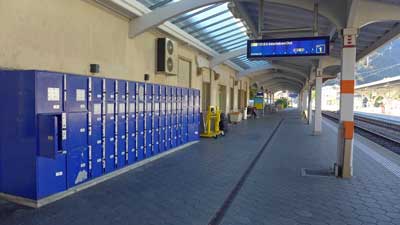
If you buy the Saver Day Pass at least 21 days in advance (and up to 60 days in advance) the 2023 cost is:
- 2nd Class (with Half Fare Card): CHF29
- 1st Class (with Half Fare Card): CHF82
- 2nd Class (with no Half Fare Card): CHF52
- 1st Class (with no Half Fare Card): CHF97
Once you research the normal cost of Swiss train fares you’ll see that the above prices are a very good deal for anyone riding more than 150 kilometers or so in a day. If you are just going, for example, from Zurich to Lucerne or Interlaken on a day, it’ll be cheaper to just buy that ticket individually. But if you are going from Geneva or Montreux to Interlaken or Lucerne then the Saver Day Pass will be much cheaper. Better still, you can use a Saver Day Pass to go from Interlaken to Geneva and back on the same day on the Goldenpass line and returning on the faster train through Bern, and it will still all be included for free.
If you don’t buy a Saver Day Pass at least 14 days in advance it’s more expensive, and if you only buy 1 to 3 days in advance it’s VERY expensive, so the key is to buy early. This is all confusing, but the Saver Day Pass should be a great option for many people only in Switzerland for one to three days.
Popular Swiss panorama scenic trains
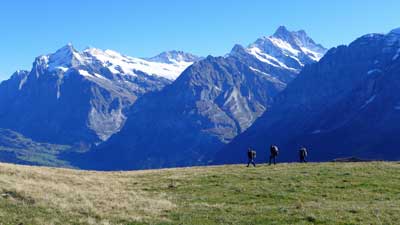
- Glacier Express
- Route: Zermatt to St. Moritz
- Train type: Panorama
- Journey time: 8 hours 3 minutes
- Distance: 291km
- 1st Class fare: CHF272
- 2nd Class fare: CHF159
- Compulsory seat reservation fee: CHF44 or 49
- Supplement for Swiss Pass holders: 13 to 33 for panorama carriage
- Bernina Express
- Route: Chur to Tirano and Lugano
- Train type: Panorama and bus
- Journey time: 4 hours 13 minutes and 3 hours 10 minutes
- Distance: 148km and 90km
- 1st Class fare: CHF113
- 2nd Class fare: CHF66
- Compulsory seat reservation fee: CHF32
- Supplement for Swiss Pass holders: 10 to 14 for panorama carriage
- GoldenPass Line
- Route: Lucerne to Montreaux
- Train type: Panorama
- Journey time: 5 hours 8 minutes
- Distance: 191 km
- Prestige Class fare: CHF131
- 1st Class fare: CHF96
- 2nd Class fare: CHF56
- Supplement for Swiss Pass holders: 8 to 15 for panorama carriage
- Gotthard Panorama Express (formerly Wilhelm Tell Express)
- Route: Lugano or Locarno to Lucerne
- Train type: Panorama and boat
- Journey time: 5 hours 21 minutes
- Distance: 182 km
- 1st Class fare: CHF164
- 2nd Class fare: CHF135
- Supplement for Swiss Pass holders: 39 to 49 for panorama carriage
- Swiss Chocolate Train
- Route: Montreux to Broc round trip
- Train type: Panorama or First Class
- Journey time: X hours X minutes
- Distance: 82 km
- 1st Class fare: CHF99
- 2nd Class fare: 89
- Supplement for Swiss Pass holders: 39
Popular Swiss scenic and theme trains
The scenic trains below are also extremely popular as sightseeing journeys rather than just as transportation, but can be used as both.
- Jungfraujoch round trip
- Route: Interlaken to Jungfraujoch
- Train type: special mountain train
- Journey time: 4 hours 41 minutes, round trip, plus time on top
- Distance: 73 km
- 1st Class fare: N/A
- 2nd Class fare: CHF224
- Supplement for Swiss Pass holders: 147 (so, a saving of CHF77)
- Gornergrat Railway
- Route: Gornergrat Railway
- Train type: Cog railway
- Journey time: 44 minutes return
- Distance: 10 km
- 1st Class fare: N/A
- 2nd Class fare: CHF90
- Supplement for Swiss Pass holders: 45
- Rigi round trip
- Route: Lucerne to Rigi
- Train type: Cog railway
- Journey time: 3 hours 25 minutes, plus time at the top
- Distance: 58 km
- 2nd Class fare: CHF78
- Supplement for Swiss Pass holders: None (this one is free with the pass)
- Mt Rigi Excursion (one-way and walk down)
- Route: Lucerne to Mt Rigi
- Train type: cogwheel train and/or cable car
- Journey time: 45 minutes up
- 1st Class fare: N/A
- 2nd Class fare: 49
- Supplement for Swiss Pass holders: 0
- Lotschberg Mountain Route and Centrovalli
- Route: Bern to Locarno
- Train type: Narrow gauge
- Journey time: 4 hours 40 minutes
- Distance: 212 km
- 1st Class fare: CHF158
- 2nd Class fare: CHF90
- Supplement for Swiss Pass holders: 5
- Jura round trip (Watchmaking Tour)
- Route: Neuchatel through Jura
- Train type: Regular
- Journey time: 3 hours 0 minutes
- Distance: 143 km
- 1st Class fare: CHF168
- 2nd Class fare: CHF108
- Supplement for Swiss Pass holders: 0
- Pre-Alpine Express
- Route: St. Gallen to Lucerne
- Train type: Regular
- Journey time: 2 hours 15 minutes
- Distance: 146 km
- 1st Class fare: CHF83
- 2nd Class fare: CHF47
- Supplement for Swiss Pass holders: 0
- Jura Foot Line
- Route: Basel to Geneva
- Train type: Regular
- Journey time: 2 hours 40 minutes
- Distance: 248 km
- 1st Class fare: CHF132
- 2nd Class fare: CHF75
- Supplement for Swiss Pass holders: 0
Popular Switzerland cable car rides
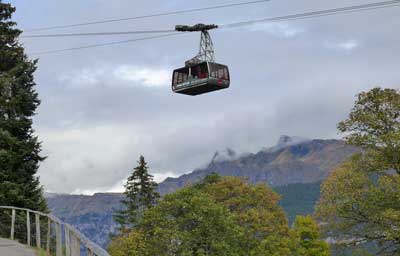
- Schilthorn
- Route: Stechelberg (Lauterbrunnen) to Schilthorn
- Train type: cable car
- Journey time: 1 hour
- 2nd Class fare: CHF108
- Supplement for Swiss Pass holders: 54
- Engelberg to Mt. Titlis cable car
- Route: Engelberg to Mt. Titlis
- Train type: cable car
- 2nd Class fare: CHF96
- Supplement for Swiss Pass holders: 46
The Swiss Travel Pass also includes free museum admission, but…
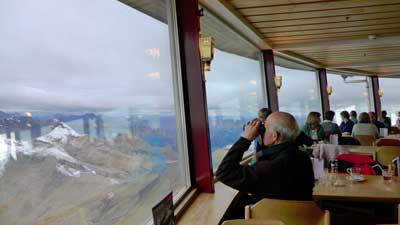
The problem is that the museums are only free on valid travel days, and almost no one would visit more than one or two museums with a Swiss Travel Pass. The trains and cable cars are so expensive that the pass gives very good value to cover those, so you don’t want to waste precious sightseeing time walking through a museum that only costs CHF10 anyway.
In other words, calculate the value of a Swiss Travel Pass on the travel savings only, and if you visit a museum here or there, then great. Most people are better off trying to squeeze in an additional train ride each day, and ignoring the museums. Switzerland is all about the outdoor scenery. As nice as the museums may be, they are not why you are there.
The pass includes free public transport in most Swiss cities
Similar to the free museum part of the offer, it’s best to ignore or minimize the value of free public transportation. It could be helpful in Zurich, but in most other Swiss tourist towns you won’t need much public transport. In fact, in Interlaken, each hotel or hostel guest automatically gets a card for free public transportation within the town (including between the two train stations).
So you might use a ride or two each day on public transport, but that won’t add up to much in terms of value of your Swiss Travel Pass.

Hi Roger– So appreciate your thoughts! Like you we are generally on the go all day (& rarely sit for a restaurant meal), so we tend to plan a much more aggressive itinerary than most. We are traveling as a group of 4 adults.
I’m trying to figure out the best train ticket– unfortunately we’re there for 6 days & there’s no Swiss travel pass for that! Our plan is to travel Zurich to Montreux on Sunday, Montreux to Zermatt on Mon, Zermatt to Wengen on Tues, Wengen to Luzern on Wed, Luzern to Lugano on Thurs, and Lugano to Zurich on Fri. We won’t do any of those special scenic train routes & we won’t do Jungfraujoch– but will do Rigi & other cable cars and cogwheels…
What type of train ticket would you recommend or do you think we should drive? Thanks so so much!
LS,
This is a tricky one. My best guess is that the 8-day Swiss Travel Pass would be your best bet. It costs CHF376, but of course it will cover all of your train trips as well as the Mt Rigi trip, which is CHF74 by itself. In your case it should be pretty easy to calculate whether that would be better than the Half Fare Card. You can go on the official Swiss rail site and check the fares for all of those rides you plan on taking. Unlike most other European countries, the train fares in Switzerland are fixed, so you can check for any day and that will be the price you’d pay.
I’m sure the Half Fare Card would save you a lot of money, but my hunch is that the 8-day Swiss Travel Pass would come out even cheaper. It would be great if you could respond again to this comment after you run the numbers. It would be interesting to know which was the better deal. -Roger
Thanks for your response on my earlier comment. I looked at some of the places we wanted to check out. As I said in my earlier post we will base in Bern.
We would love to see Lucerne, Zurich, Geneva, Berner Oberland area, INterlaken, Thun.
We would also like to do the jungfraujoch and glacier express.
With that being said I realize some of these places, like Thun we wont spend a whole day, but just want to see it and explore a bit. With those things in mind, do you think the swiss travel pass is our best bet or the HalfFare Card?
Hi roger,
Thanks so much for your post. I just have a few questions concerning my wife and i’s upcoming trip. We plan on being in Switzerland from August 28-September 4th. We plan on flying in from London to Basel airport taking a train to Bern and setting up shop there. We will base in Bern and plan on taking four day trips. I am still in the middle of our research, so we haven’t narrowed down each day yet. I know we definitely want to do the Jungfraujoch trip, but not sure about other long trips. I have been back and forth on whether to buy the swiss travel pass or not, and after reading your article and all of the comments I am not sure. I was thinking with the day trips and amount of public transportation we plan on using for those trips it would pay for itself, but I’m not sure now. What do you think?
Khiry,
As far as Swiss cities are concerned, Bern is the best choice, but still I prefer the more scenic small towns. That said, it really depends on where your other day trips will be to. My best guess is that the Swiss Travel Pass would be your best choice because those round-trip train journeys each day will add up in cost quickly. For example, Bern to Interlaken will cost CHF29 each way with no discount, so that is CHF58 right there. Then Interlaken to Gimmelwald or Lauterbrunnen adds to the cost, not to mention Jungfraujoch or Schilthorn.
The Half Fare Card would obviously also save you a lot off the full fare, but you’d really have to run the numbers on the Swiss rail site – sbb.ch – to see which would save more. Needless to say, the longer those day trips are, the better the Swiss Travel Pass looks. Let me know if you have any other questions. -Roger
Thank you so much for your response, Roger! 🙂
All the best,
Jay
Hello Roger,
This is my itinerary. I’m confused if I should choose Swiss Travel Pass or Half Fare Pass. Half fare pass seems easier to understand. What do you suggest? And anything you’d like to add to my itinerary? Thanks
Day 1: Zurich to Luzern. Overnight Luzern
Day 2: Take boat from luzern to Vitznau, change to cogwheel train to Rigi Kulm. Take cogwheel train to rig kaltbad, range cable car down to Weggis back to overnight Luzern
Day 3: Excurstion to Mt. Titles. Afternoon to mt. pilatus. Overnight Luzern
Day 4: Take earliest train to Interlaken and then Shilthorn , overnight Lauterbrunnen
Day 5: Earliest train to Jungfraujoch. Overnight Lauterbrunnen
Day 6: Interlaken morning. Afternoon in Bern. Overnight Bern
Day 7: Early to Lausanne. Afternoon bus to Montreux. Overnight Montreux
Day 8: Chateau de Chillon, Afternoon train to Zermatt. Overnight Zermatt
Day 9: Gornergrat & Glacier Paradise in morning. Afternoon walk around town in Zermatt. I hope i can get an overnight train or something to Milan
Day 10: Arrive in Milan. Overnight Milan
Day 11: Train to Como. Ferry to Bellagio. Overnight Bellagio
Day 12: Ferry to Varenna . Train to Tirano. Bernina Express to Chur. Spend an hour in Chur. Take train to Zurich. Overnight Zurich.
Day 13: Train to Rhine falls. Rest of the day in Zurich. Overnight Zurich
Day 14: Leave Switzerland
Charles,
I know what you mean about the confusion. Mainly it’s a case of adding up the full price of the various train rides you are going to take, plus Rigi and the boat rides, and seeing if that is more or less than the cost of the 15-day Swiss Travel Pass. You’d definitely save a LOT with the Half Fare Card compared to full price. My hunch is that the Swiss Travel Pass would save even more because you have many longer train rides planned. But you’d really have to add them up to be sure.
Another advantage of the Swiss Travel Pass compared to the Half Fare Card is that almost all trains and buses are free, so you will probably find other little side trips to take, which would basically be free with the Pass and still fairly expensive with the Half Fare Card.
Your itinerary looks very complete as it is and you are covering nearly all of the famous attractions in Switzerland. Unfortunately there is no overnight train between Zermatt and Milan. The normal trains take 3 hours 24 minutes with a change in Brig. The only option that goes overnight includes a 4 hour wait in Domodossola from about 1am to 5am, so it wouldn’t be helpful. The last daytime train leaves Zermatt at 19:13 and arrives in Milan at 22:37. That is probably your best bet. Let me know if you have any other questions, and best of luck with all of this. -Roger
Hi Roger,
Thanks a ton again for the valuable suggestions!
I have booked my stay for 1 night in Venice now and in the main island itself!
Again like you suggested I have booked all train tickets- Munich to Zurich, Domodossola to Venice, Venice to Marseilles and Marseilles to Paris to get best price.
I have though not booked any apartment yet. Actually, I was wondering if we can do some parts of Bernia/ Glacier express too, while staying in Interlaken as base. Is it possible? The other option is of course to to split my stay and spend 1 night in south, somewhere close to Domodossola. What would you recommend?
Again my inclination is not to split the stay (I am not even sure if apartment stays allows check out on a Friday) but if that is the only option (to allow me views of southern vistas) I would do that while I can.
Tarun,
The major challenge with that idea is that there are no direct trains that run between Interlaken and Chur or any of the other stops on the Bernina Express. You have to either go to Zurich to change trains, or even Bern in some cases. It will take you at least 4 hours to get from Interlaken to any of the stops on the Bernina Express, so even doing it as an overnight will require long days on the train. That is certainly a fantastic train ride, but honestly every train ride in Switzerland except those in the Zurich area is quite scenic, so you may not want to go that far out of your way. Sorry for the bad news. Let me know if you have any other questions. -Roger
Hello Roger,
You are very diligent and patient in answering questions as I see it, very helpful, thank you!
I will be travelling to Switzerland from Prague on Sept 20th for 3 days with 600-700 USD budget. I am not an extreme adventurer but really want to see the mountains and taste Swiss cheese and chocolates. As I am from a tropical country and since I’ll be travelling alone, the least I would want to worry about is me being sick of a very cold weather (not sure if this is the case for Sept). I am interested to see, Interlaken, Gimmelwald, Jungfrau and experience at least one scenic train ride. I don’t really care if I see it from the top, mid or bottom view, at least a good picturesque view to enjoy the mountain view. With my budget and all other I’ve mentioned, what do you think would be the best recommendation? And would half Swiss pass help me save on this trip? Thank you so much
Jay,
I do think that the Half Fare Card will be great value for you. Nearly everything in Switzerland has a high price tag, and to be able to cut most of those in half for about US$120 is a great deal. You shouldn’t have especially cold weather in September, except for if and when you visit the mountain peaks such as Jungfraujoch or Schilthorn. Booking at the Mountain Hostel in Gimmelwald would be a great way to save money on lodging and get those views that you are after. Honestly, the view from the Mountain Hostel (or anywhere in Gimmelwald) is one of the most beautiful things you’ll ever see. And it’s basically free after you take the cheap cable car one stop up from the valley.
The other way to save money will be to buy most of your food from supermarkets. There is a Coop supermarket near each train station, and there is even one in Murren, which is just above Gimmelwald. You can buy sandwiches and salads and things like that for around US$5 to US$8, while a meal in pretty much any restaurant is going to start at around US$20. I’m sure you’ll have a wonderful time. Let me know if you have any other specific questions. -Roger
Hi Roger,
I like your suggestion to stay in Gimmelwald if possible. Tried for hotels but we managed to get one in Wengen instead and cancelled Interlaken one.
Thanks again
Omana
Thanks for your quick reply,
One more question,
As i travelling in ,
Day 1 : Mt Rigi, Mt Pilatus ( if i could complete in one day )
Stay at Luzern
Day 2 : Mt Titlus and Golden Pass to Interlaken
I think Tell-pass can be good option for me ?
I heard it has Titlus cable car also free which cost 92 CHF in halfcard and swiss pas ….
Adi,
It looks like the Tell Pass would be ideal for the visit you have in mind. Those individual train rides and cable cars are fairly expensive on their own. Those will be busy days for you, but if you start early in the morning you can do it all and have a wonderful time. Have a great trip. -Roger
Hi Roger,
Thanks for your earlier reply (long back- 2nd July, I was away on a work trip so kinda late). Now, I have booked my air tickets and here is my broad itinerary:
1. Arrive in Munich on 21st Sept
2. 2 nights in Munich- Oktoberfest, castles
3. Munich to Lucerne/Brienz/ Gimmelwald by train on 23rd
4. 7 nights in an apartment in either of the above mentioned 3 (I would certainly prefer to stay all 7 nights in one place rather than splitting because of cost and logistics)
5. Interlaken to Venice on 30th Sept by train
6. Venice to Marseilles on 1st Oct
7. Marseilles to Paris on 3rd Oct
8. Paris to Delhi on 7th Oct
As you had suggested I would buy a swisspass for 8 days. Can you also help me decide on the following:
A) Apartment for 7 nights- as you had suggested I am exploring Gimmelwald as my base, however, as I plan to visit Pilatus, Titlis, Rhine falls, Zermatt, Berne etc. during the 7 days, do you think it would be a good idea considering the connection time from Gimmelwald to Interlaken and will it be free travel between the two with Swisspass?
b) On the next part of trip post Switzerland, I am still weighing my options between Nice and Venice. I was earlier planning to fly to Nice and had found a fairly cheap flight (Easy jet flight from Zurich to Nice- approx 160CHF for 2 people with total 3 hold bags). However, I am not sure whether I can make it to Zurich airport for this 9.40 am flight. Also, like you had mentioned that the train journey from Interlaken to Milan offers some of the best sights and the connection to Nice passes through Milan, so I included Venice in my itinerary. Would you suggest this or should I switch back to moving directly to Nice?
c) For the week in Italy/France should I explore a 3/ 4 days Eurail pass or buying point to point tickets is better? Within France I plan to stay 1 to 2 nights in Marseille (some old memories!) and remaining in Paris so not many long journeys.
Thanks again!
Tarun
Tarun,
I would be surprised if there were any apartment rentals in Gimmelwald. It’s lovely, but it’s literally just a village with about 40 small farms and a few hotels. With so many trips out of the Interlaken area planned, I think the best location would be to stay either close to either of the train stations in Interlaken, or near the Lauterbrunnen train station. Nearly all of the sights in the Interlaken area are reached through connections in Lauterbrunnen. It’s a small town, and I’d probably think that staying near Interlaken Ost station would be better for a full week.
There is a train leaving Interlaken Ost at 5:21am that reaches Zurich Airport at 7:42am every morning. The trains in Switzerland are famously punctual so that one would work well. Still, I much prefer the train and if you can include a short visit to Venice on this trip you should. It’s extremely crowded during the day but not bad in the early morning and early evening, so the trick is to stay overnight on the main island itself.
For Italy and France I would just buy advanced train tickets online as early as possible. The tickets in Italy are fairly cheap to begin with, so the rail passes aren’t very helpful. And in France you are required to also buy an expensive seat reservation on many popular trains, so the passes don’t save much there either. The good news is that if you buy at least a month or so early you can get very reasonably priced train tickets in both countries. Have a fantastic trip. -Roger